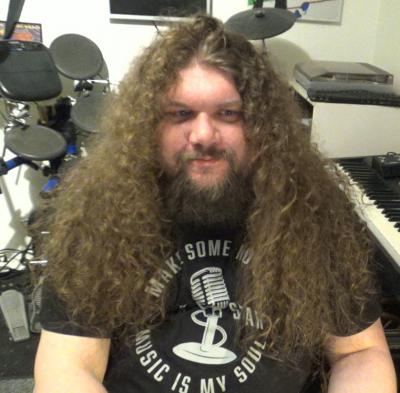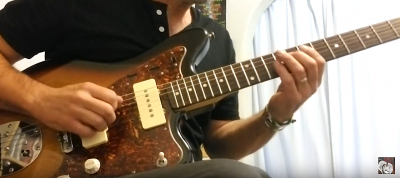Versatility Vs. Expertise; Variety Vs. Intensity, How to practice? |
|
|
|
|
|
| Feb 17 2019, 11:30 AM |
|
The short answer is, as you say, it depends on goals and expectations, and not only that - we all learn differently.
- Does it work for you? Yes? Then maybe continue. - Could it work better for you? Yes? Then maybe expand on your idea. - Does it not work for you? Then maybe re-invent your practice routine. I am not quite there yet, but I had to approach my practicing (or lack of) from a different way. I used to think "I should practice this for 30 minutes" and write "legato: 30 minutes" as a goal of a practice routine. For me that didn't work, as I would practice 1 minute and blame myself for not doing 30 minutes, and I would tell myself it wasn't good enough. In a way that made any practice not be good enough, while in reality 1 minute is better than 0 minutes. So I have worked on a practice log, and I'm still working on it: https://www.guitarmasterclass.net/guitar_fo...c=59967&hl= It is to encourage me to spend the time I feel like and want to spend, while also maintaining a vision of progress. Now, this is a bit besides your point of course. Evaluate your goals, your methods and see where it gets you. If you do 2 months of tapping to become a tapping master, then 2 months of alternate picking to become a master of that and so on, you will eventually find you need to maintain that level, I think. That does not mean you will lose your skill set. It's a bit like riding a bicycle. Once it's really placed in there, I don't think you forget that easily. I know there's some muscle memory and training in that, but if you have practiced regularly and been comfortable at 170 bpm and that has been stored, then if you take a break for 2 months you won't be pushed all the way back to 120 bpm - or at least it likely wouldn't take you as long to get up to speed as it took in the first place. I think your complex solution is good too, as it's a good compromise. I think that would work for me personally. I have wanted similar when it comes to classes in school, but it's hard to tell whether it would work in areas such as that. |
|
|
||
|
|
|
|
| Feb 18 2019, 04:24 AM |
|
I could not have said it any better myself so there is no point in repeating it
Todd The short answer is, as you say, it depends on goals and expectations, and not only that - we all learn differently.
- Does it work for you? Yes? Then maybe continue. - Could it work better for you? Yes? Then maybe expand on your idea. - Does it not work for you? Then maybe re-invent your practice routine. I am not quite there yet, but I had to approach my practicing (or lack of) from a different way. I used to think "I should practice this for 30 minutes" and write "legato: 30 minutes" as a goal of a practice routine. For me that didn't work, as I would practice 1 minute and blame myself for not doing 30 minutes, and I would tell myself it wasn't good enough. In a way that made any practice not be good enough, while in reality 1 minute is better than 0 minutes. So I have worked on a practice log, and I'm still working on it: https://www.guitarmasterclass.net/guitar_fo...c=59967&hl= It is to encourage me to spend the time I feel like and want to spend, while also maintaining a vision of progress. Now, this is a bit besides your point of course. Evaluate your goals, your methods and see where it gets you. If you do 2 months of tapping to become a tapping master, then 2 months of alternate picking to become a master of that and so on, you will eventually find you need to maintain that level, I think. That does not mean you will lose your skill set. It's a bit like riding a bicycle. Once it's really placed in there, I don't think you forget that easily. I know there's some muscle memory and training in that, but if you have practiced regularly and been comfortable at 170 bpm and that has been stored, then if you take a break for 2 months you won't be pushed all the way back to 120 bpm - or at least it likely wouldn't take you as long to get up to speed as it took in the first place. I think your complex solution is good too, as it's a good compromise. I think that would work for me personally. I have wanted similar when it comes to classes in school, but it's hard to tell whether it would work in areas such as that. |
|
|
||
|
|
|
|
| Feb 18 2019, 10:22 AM |
|
Hi
I like the 2 idea, because I practice it. I try to learn 3 - 4 lesson max I make my own exercices to improve each lesson To resume - If you want work somes technic you can learn Stephane lucarelli's lesson Sweeping, hybrid picking, palm muting Creative arpeggios is a great lesson Darius's lesson Alternate picking, palm muting Alternate picking workout 2 is the best for me Muris's lesson Esay Jazz chord Jazz swing rythm is a wonderfull lesson Chris Harrington's lesson Blues BB King Blues is the magic lesson Learn slowly is very important to get the good right anf left hand attitude There are thousands of lessons here, the main thing is not to get lost and not aim too high level. Also, the level is not always adapted, sometimes a lesson 3 is very difficult and another 5 easier This post has been edited by MisterM: Feb 18 2019, 10:28 AM |
|
|
||
|
|
|
|
| Feb 19 2019, 04:50 PM |
|
Wise words and "truth" right here ...
To make things work, it's also very important what lesson you choose. Even if we can analyze our playing in an objective way, it remains a tricky thing to choose the perfect lesson for a good development. That's why in my case the one who choose the lessons for me, is my instructor. He knows very well what lesson I need and I should learn for a fast progress. The lessons that he chooses for me are very complex and require to manage a mix of techniques. We are very honest with each other and this has helped us to build a solid team. My instructor it's the only person I trust because I know he will never lie to me. He always tells me the true and that's why he is very special for me. All my progress is due to him. ...from my point of view it's much hard to manage correctly 10 techniques at 120 bpm than 1 single technique at a faster tempo. I'll add that it's all about "application". If you don't use whatever technique or concept in songs or solos on a fairly regular basis, you'll never make it sound like music. If you think it would be cool to throw a jazz lick into a metal solo, work on composing a metal solo that incorporates a jazz line ... and then do another one. This post has been edited by klasaine: Feb 19 2019, 04:52 PM -------------------- - Ken Lasaine
https://soundcloud.com/klasaine2/foolin-the-clouds https://soundcloud.com/klasaine2/surfin-at-the-country-hop Soundcloud assorted ... https://soundcloud.com/klasaine3 New record ... http://www.cdbaby.com/cd/kenlasaine Solo Guitar ... https://www.youtube.com/playlist?list=PLXZh...5iIdO2tpgtj25Ke Stuff I'm on ... https://www.youtube.com/playlist?list=PLXZh...b-dhb-4B0KgRY-d |
|
|
||
|
|
|
|
| Feb 19 2019, 05:29 PM |
|
Thanks for all the responses, gave me a lot to think about!
|
|
|
||
1 User(s) are reading this topic (1 Guests and 0 Anonymous Users)
0 Members:































